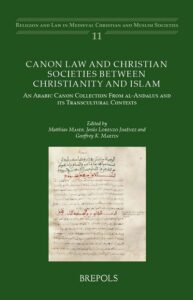Print Matters: Canon Law and Christian Societies Between Christianity and Islam
Brepols published a book entitled "Canon Law and Christian Societies Between Christianity and Islam. An Arabic Canon Collection From al-Andalus and its Transcultural Contexts", edited by Matthias Maser, Jesús Lorenzo Jiménez, and Geoffrey K. Martin. We spoke to editor Geoffrey K. Martin and asked him to tell us a bit about the publication. Read the interesting interview below.
Geoffrey, What kind of book is it?
Geoffrey: The book is a collection of article-length contributions that focus upon the lives of Christian religious men and women under Islam in the medieval world. Many of the authors in the collection have treated an eleventh-century Arabic manuscript of Christian canon law from Iberia. It is one of our most informative sources for understanding how Christians lived under Muslim rule there, and, as well, how Christians continued to work in Arabic even as their communities came under Christian rule following a series of conquests from roughly the eleventh century forward.
On a broader level, the book is an academic one, but the contributions will hopefully interest non-academics as well.
As the cover says, the volume presents the results of a recent interdisciplinary research project on the Arabic canon law manuscript. Can you elaborate a bit on this?
Geoffrey: I will add to what Matthias has written / said here, since Ana Echevarría and he are the driving force behind the project and the Gerda Henkel fellowship which funded it. I have worked as a postdoctoral scholar on the project, with an interest primarily in the theology that we see in this eleventh-century Arabic manuscript. Much of my work to date has involved reading and transcribing the Arabic, but also working with contemporary Latin collections of these laws as well. In effect, the eleventh-century Arabic manuscript is a copy of a lost original Arabic manuscript, which in turn follows Latin canon law collections from the early middle ages as well. In looking at how the Arabic differs from the Latin, I am able to argue that the Christians who worked with the Arabic collection were very attuned to theological debates that learned Muslims, Christians, and Jews had between roughly the tenth and twelfth centuries. As far as the interdisciplinary nature of the project goes, I am very much a historian by training, but benefit greatly from working with Arabic philologists, as one example.
The title refers to a transcultural context. In terms of the results of your research, are there any lines that might be drawn to today?
Geoffrey: I hesitate to draw a direct line between relations between Muslims, Christians, and Jews in the modern and the eleventh-century communities about which we have written. But in general, the Arabic manuscript lets us see that while Muslims and Christians disagreed about the nature of God—Jesus for Muslims is a human prophet, as opposed to the son of God in Christianity, as one example—these eleventh-century Christians nevertheless worked in an intellectual world that owed much to the Arabic language and Muslim thinkers. They could simultaneously argue against Islam as a religion, but appreciate the culture / learning that came with Islam in the middle ages.
***
Thank you for the interview, Geoffrey!
Read here more about the book:
